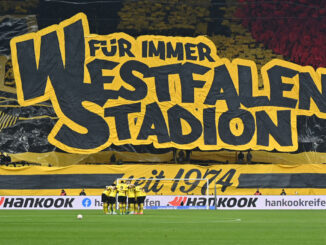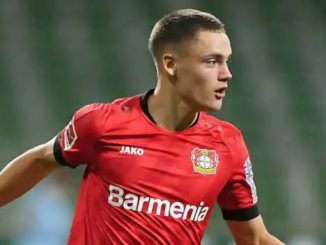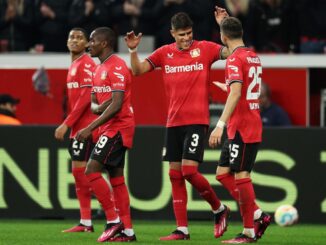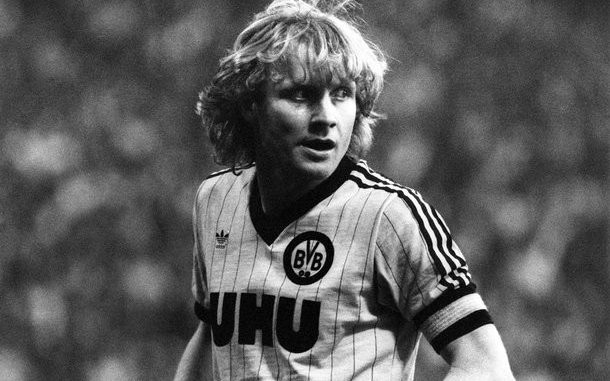
Manfred “Manni” Burgsmüller who died in May 2019, would have been 70 this year. The former German international played as a striker and occasionally operated as a midfielder and was Borussia Dortmund’s all-time record goal-scorer.
Burgsmüller appeared in 447 Bundesliga games over the course of 17 seasons, mainly for Borussia Dortmund and Werder Bremen, scoring 213 goals. Burgsmüller also spent time at Rot-Weiss Essen and Bayer Uerdingen. In his initial stretch with RW Essen, then playing in “2 Bundesliga-Nord” as the second tier was called until 1976, he scored 29 goals in one season, followed by a 22-goal campaign. Burgsmüller left Uerdingen for Borussia Dortmund in October 1976. With Borussia Dortmund, he came in initially as a midfielder. In the 1980– 81 campaign, he scored a first-division career-best 27 goals, helping the North Rhine-Westphalia side reach seventh. He finished second behind Karl-Heinz Rummenigge of champions FC Bayern Munich in the goal-scorer list.
Burgsmüller started the next season in scoring fashion, netting seven times in only 15 matches. In November 1985, at nearly 36, he returned to the Bundesliga, signing for SV Werder Bremen where he would deliver his greatest success. He scored in his first game, a 2–1 win at Borussia Mönchengladbach and added two in his third match, a 6–0 home routing of VfB Stuttgart. He totalled 13 goals in only 20 matches for the club, as Werder finished second. During his spell, the veteran appeared in 115 league games with 34 goals, proving an important attacking element in the conquest of the 1988 league title.
🎉 #HappyBirthday, Manni Burgsmüller (68)!
Zur Feier des Tages gibt's einige seiner unvergessenen Szenen aus den 70ern und 80ern! pic.twitter.com/q95hCcpvww— Borussia Dortmund (@BVB) December 22, 2017
Burgsmüller retired at nearly 41 years of age, also having appeared three times for West Germany. His national-team debut came on 16 November 1977, in a 4–1 win with Switzerland. After retiring professionally, he played as a placekicker with Rhine Fire in the World League of American Football. Manni worked for Reebok and in televsion after retirement from athletics.
This interview was conducted by Ben McFadyean, founding president of Borussia Dortmund Fan Club London. The interview was conducted in German and also translated by Ben McFadyean.
Ben McFadyean (BM): It’s a real special thing for me to talk to you the newest honorary member of the London BVB fan club. You join a special group of players we are honoured to have as members, including (Neven) Subotic, (Jörg) Heinrich, (Martin) Kree, and (Marcel) Raducanu. Thank you for joining our fan club and accepting our gift of lifelong membership.
Manni Burgsmüller (MB): It’s special also for me, as you are the first BVB fan club to invite me to become an honorary member. Also, London is a special place, and I think it is really cool indeed that English fans come all the way over to Dortmund to watch their football. I am happy to accept the membership, thanks for this.
BM: Even (Pierre-Emerick) Aubameyang and (Robert) Lewandowski didn’t match your scoring record. I would like to acknowledge you for your amazing career at Dortmund. really impressive, top of the all-time goal-scoring list, but just three goals ahead of Michael Zorc, the current director of football at the club, former captain, and all-round great of BVB, but your last match was in 1983 and no player has ever caught up. How does it feel to be at the top of this list and could you ever have foreseen Michael Zorc’s success?
MB: (laughing) Yeah and that is one record ‘Susi’ (Michael Zorc) will never break! Of course, I am proud of my time at BVB and the goals scored. I remember Zorc when he first arrived; he was always ambitious. In fact, I am certain it was me who gave him the nickname ‘Susi.’ He had even longer hair than me, long brown hair, or was it Rolf Rüssmann (BVB defender from 1984 to 1988)? Zorc came from a local team in Dortmund, Tus Eving-Lindenhorst. He was barely 18-years-old when he joined. You could see he would succeed. He worked really hard. In terms of commitment, he was ahead of the curve. I am pleased things worked out the way they did for him. He has done an amazing job with BVB, a genuine leader.
BM: I remember this song that went “Manni, Manni, Manni Burgsmüller . . . ’. Can you tell us about the background to the song? What did the chant mean to you? Was it a special tribute from the Südtribune?
MB: I don’t remember how it came about as a fan chant. It was (based off) an Abba song (‘Money Money Money’). They were then a massive pop group in Germany. It was a special BVB anthem, especially the first times it was sung, but you know as a player every time you hear your name it makes you feel special. After that, it’s total concentration. I don’t remember how it came about. You know the atmosphere at the Westfalenstadion was not like it is now. Maybe you remember the stadium? A story I can tell you, the Westfalen used to have open corners. I remember arriving in the team bus, and we would drive down the side of the stadium to our changing rooms before the game. From the bus, you could see the Südtribüne was already packed to the rafters even two hours before the match! They would be singing and celebrating. I don’t remember especially the chant, but the Südtribüne? Goose pimples! I still follow many matches of BVB and often go to the Westfalenstadion, as I also do the Weserstadion in Bremen, although they are not doing so great over the last two seasons. It’s impressive to see BVB now. They were a middling side in the Bundesliga when I played at Borussia, special, but not in the way of today. The stadium is also spectacular now; It’s on a different scale. Back then, it was 54,000 in total, so the Südtribüne was much smaller, but still a unique atmosphere.
BM: You played with some special players. I remember the team with Rolf Russmann, Lothar Huber, Sigi Bönighausen, the young Michael Zorc, and Eike Immel the goalkeeper. Immel left for VFB Stuttgart, and I remember clearly he said he was ‘leaving because he wanted to be successful.’ Of course, that very next season BVB won the DFB Pokal against your new team at Werder Bremen (4-1), so I guess Immel missed that one?!
MB: Otto Rehhagel is a special memory for me. You will remember that it was Rehhagel who brought me to Dortmund where he was the coach. Everything was as it had to be. Rehhagel was an inspirational leader. I was lucky to play under him at both Dortmund and Werder. Immel was an exceptional keeper. When he joined, he was just 18; a nice lad, but green behind the ears, I think the Stuttgart thing somehow worked for him, but he left a void at Dortmund. You may remember one special guy as a fan of BVB. When I was at Werder, I was given a special task by Rehhagel. A youngster joined the club, and I was asked to ‘take him under my wing’ as an apprentice, Karl-Heinz Riedle. I looked after him, helped him to get his first apartment, and showed him the ropes. There are some great stories, but I think ‘Kalle’ would rather I don’t share those (laughs).
BM: I also admire your former colleague Kalle Riedle, a legend in England (Fulham and Liverpool) and Germany, and Champions League winner with the Borussia. I would love to hear those stories! So, have you ever been to a Premier League match? Do you have a favourite English team?
MB: I worked for some years for Reebok, the kit manufacturer, and actually caught up many years later with Kalle Riedle when he was a player at Anfield. Liverpool were a Reebok team at the time. Kt was my only game on ‘Der Insel’ (Great Britain aka ‘the Island’), but English football is special. I have been a big fan of Liverpool since that time. Anfield is special and of course, because of ‘Kloppo’ I still keep an interest in ‘the Reds’.
BM: So Liverpool is your English team. Did you ever have a chance to transfer to another club overseas? Players didn’t go overseas in those days as much as they do now. Can’t help asking do you have a favourite team in Germany by the way?
MB: I had the chance when I was at RW Essen. I negotiated with RSC Anderlecht and was close to a transfer. They were UEFA champions at the time and were heavily sponsored by a big brewery. I would have been a big move. I joined Dortmund, and the rest is history. Of course, Werder and Dortmund are special. I spent the largest time there, but all of the teams I played for are somehow my teams. No, in Germany my team is SSV Hacheney.
BM: Hacheney! The team you coached who were playing in the Kreisliga. You were part of the Kabel 1 TV series ‘Helden der Kreisklasse’ as a coach. I have read about it.
MB: You are well-informed. That’s great! I was part of a TV series for German channel Kabel Eins. I had not managed before, but I took over coaching local Dortmund team SSV Hacheney for one season in 2004-05 and 2005-06 with the aim to keep them from being relegated, but through work and commitment, we managed to bounce straight back. The promotion was a curse, however, as the club was unable to find sponsors. We had an amazing time though, as you will have read, two incredible seasons. I had never done anything like that before. During the series, we had guest appearances in the team by legends like ex-Hamburg keeper Uli Stein, Gerald Asamoah, current BVB keeper Roman Weidenfeller, ex BVB players like Michael Lusch, Michael Schulz, Wolfgang de Beer, Steffen Freund, and Willi ‘Ente’ Lippens, all of whom joined Hacheney. It made great TV viewing, but sadly the club is no more. Hacheney folded in 2007. Totally wasted effort, but I learned a lot, and it was a unique experience. I am not a coach, though.
BM: So coaching is not for you. You coached, you worked for Reebok, and you also own an apparel company and even played American football? You have had an amazingly diverse involvement in sports. Tell us about the American-football episode.
MB: I was actually a kicker with a club called ‘Rhein Fire’ from 1996-2002 in the European equivalent of the NFL, the American football league, for several years. The kicker is the player who converts the goals after a touchdown has been scored. It was quite a challenge after my career in soccer. We actually won two World Bowls, the highest trophy in American football outside of the NFL.

BM: A signature question from me this time; I have collected football shirts since I was a child and have many. Which shirts do you still have from your career? The UHU shirt was amazing. You will have kept some shirts from special games, I guess?
MB: Looking back, some of the shorts especially, they were so tight! It is funny seeing some games, but I also like classic shirts. You may be amazed, but I don’t have one single shirt from then. I gave them all away over the years, actually, I would love to find one with UHU on the front from that BVB era. If you get one, please let me know! I would love to have one on my wall.
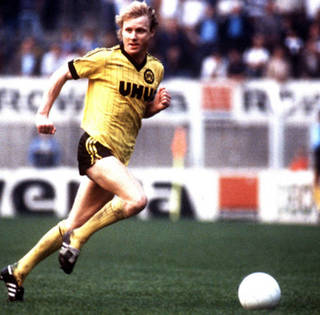
BM: What about with the German national team? You were called up for Germany, but played just three matches. As a fan, it is hard to imagine. What is it like to play for the national team? Your debut was against Switzerland in Stuttgart. What do you remember about it? I am sure you have kept that shirt from your debut, no?
MB: No. In those days, there just weren’t that many shirts to keep. We handed them in, and I don’t know what happened to those shirts. The call-up for the national team, especially in my time, was and is something very special, that chance to play for your country. I played only three matches for the national team. Helmut Schön, the coach, was a tactician, and he was looking for a classic number nine, which I never was. You remember I was more of an offensive midfielder. I didn’t see enough of ‘Die Mannschaft’ for these reasons I think. The debut was special. You may remember Klaus Fischer?
BM: The striker for the national team and local rivals from the blue team from Gelsenkirchen? 268 top-tier goals, 45 caps for Germany. I know of him. A great striker, but wrong team!
MB: The same one. It was my debut in the national team, and I hit a bicycle-kick goal, which was not given by the referee. But amazingly, Fischer scored with an identical bicycle-kick goal in the same match. It was a trademark type of goal for him. I have no regrets, but you know the national team was dominated by Bayern then. Do you remember Norbert Eder the Bayern defender? By far my worst opponent. Norbert was really grim. I later actually played with him at 1 FC Nürnberg, and we are still friends to this day, but he was horrible opponent. He always knew exactly what my play would be, even before I played it. It’s like that with some in football; there is a kind of intuitive play. Eder was like that. It was intuitive.
BM: You are the all-time record goalscorer at BVB with 135 goals just ahead of Michael Zorc. Do you think Zorc would love to have your record?
MB: Yeah and he won’t be getting that record anytime soon either (laughs). -I am amazed it (my record) is still there 30 years later.
BM: I want to ask you firstly what is the right name for the blue team from near Dortmund for you guys as players. What did you call it? There are so many names that float around one we don’t say it the one beginning with ‘S’. Maybe you can help with that? Above all though, tell me as a player, what does Revierderby mean when you are a BVB player? Is it really different to other big matches?
MB: Gosh! Revierderby, It’s like a cup final every time, maybe bigger. It’s the whole atmosphere around it. Everyone in the area is interested in this classic match for weeks before and after. There is nothing else people in Dortmund talk about, and if you win, it is celebrated like a trophy, don’t even mention scoring in it. Scoring in front of the Südtribüne is a lift. Scoring in the Revierderby is something else.
Your question is simple, the players say ‘Herne-West’; the word beginning with ‘S’ is not used. I will tell you a funny story about Herne-West. For many years now, I meet with my buddies at the end of the week at a gym for sauna to have some beers. One week, a new friend comes to the sauna and, as is customary, buys a round. So the guy, I forget his name, turns up with a crate of beer, which is not a bad start. But then we get into the light and we see that he brought a brand called Veltins! Not a good start to the friendship! That guy never brought beer again. Now we drink the Essen beer Stauderbier. Nothing from Herne-West comes into my place, not even 30 years later. That’s an absolute certainty.

